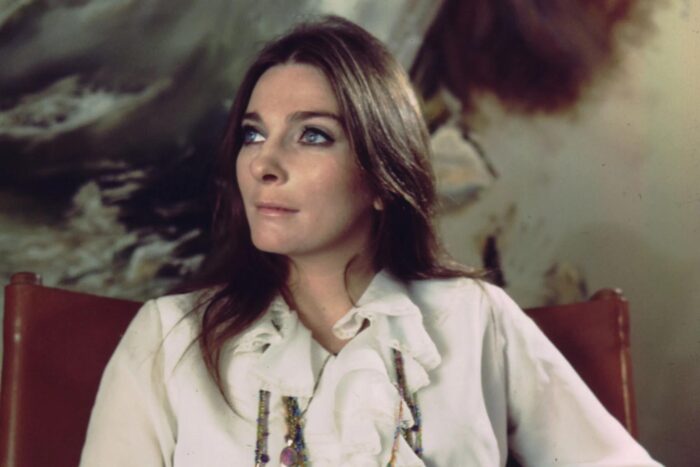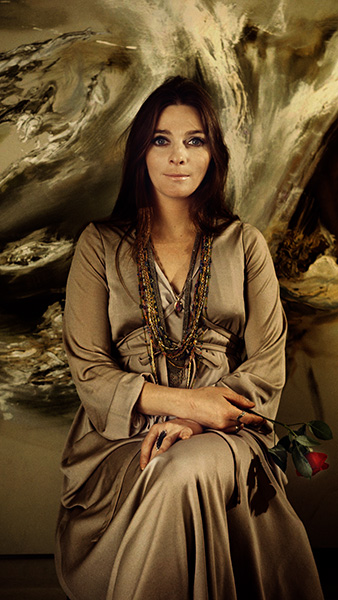Judy Collins Leaves Us Spellbound – 13th Floor Musictalk
Judy Collins has just released her 29th studio album, Spellbound – the very first to made up of all her own songs. The legendary singer-songwriter takes us on a trip from her childhood, where she spent a lot of time in isolation with polio and then tuberculosis; through her early career in New York’s Greenwich Village, right up to the present, where she is still touring and hosting her own podcast.
Listen in as Marty Duda talks to Judy Collins. So much to talk about!
Here’s a transcript for those who prefer to read instead of listen – along with videos and photos.
~~~~~~~~~~~~~~~~~~~~~~~~~~~~~~~~~~~~
MD: How’s things with you?
JC: Oh, they’re wonderful. I’m in Santa Fe, New Mexico, which is gorgeous. And I’ve been here for 12 hours.
MD: You’re on the road, right?
JC: I’m on the road.
MD: How is the tour going?
JC: Oh, it’s going splendidly. We’re really having a fantastic time with this new album. Yeah, like so many of the songs done, it’s good.
MD: It must be a change from what you were doing before to be doing so many of your own tunes.
JC: Well, I always sprinkle some of my own songs into the album, into the concert. So but now we mix it up a little more.
MD: So what brought this on? Putting an album out of all of your own tunes at this late stage?
JC: A couple of things really. I always have been writing songs.
MD: Sure.
JC: It’s just that I haven’t always… you know, we I haven’t always had, I haven’t, I think ever has so many that wound up making the whole album, which has been fun. It’s great.
MD: So, I mean, because you’ve always kind of been looked at as an interpreter as well as a songwriter. So are you changing the way you look at yourself now with doing all this writing?
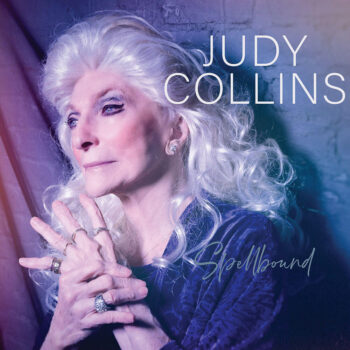 C: No, no, not at all. I think just the, the larger percentage of what I do will be my own music, but it’s always been part of it. The big song in concert, for a long time has been The Blizzard, which is my song. And so I know, I know that I’m known for a lot of my songs, too vast, and My Father and Secret Gardens and so I know that I’m known for my own songs. So now just from my own thought, there you go. That’s the only difference. In this album, I’m very, very pleased with the album. And it’s giving me a lot of satisfaction to have done it.
C: No, no, not at all. I think just the, the larger percentage of what I do will be my own music, but it’s always been part of it. The big song in concert, for a long time has been The Blizzard, which is my song. And so I know, I know that I’m known for a lot of my songs, too vast, and My Father and Secret Gardens and so I know that I’m known for my own songs. So now just from my own thought, there you go. That’s the only difference. In this album, I’m very, very pleased with the album. And it’s giving me a lot of satisfaction to have done it.
MD: Now let’s see, you’ve dedicated it to Pete Seeger and Woody Guthrie. A couple of guys who know a bit about song-writing. Why was that?
JC: Because they really started this whole thing. And they made it possible for somebody to go out on the stage with a guitar. You know, what they did, the reason that they started doing what they did, was to raise money for the Unions. That’s where their concerts were leading them in the old days. And so they really started a whole generation, a whole movement of singer songwriters.
MD: And I’m assuming that you at least have met and had some kind of interaction with Pete Seeger. I’m not sure about Woody Guthrie.
JC: A very strong friendship very long, because when I got to New York in 1961, I was…right away I met him right away. I was managed by the guy who managed him, Harold Leventhal. He had quit the lingerie business to manage Pete Seeger and Woody Guthrie and The Weavers. Right. And so, I was in the midst of all of these writers and singers. And so it was, you know, it was very, very, advantageous to my whole structure of my life.
MD: Now listening to this, the album as a whole, one gets a sense that you’re telling the story of your own life through these songs. So, When I was a Girl in Colorado is fairly self-explanatory. So, do you spend a lot of time thinking about that kind of thing or you feel comfortable sharing that with your audience?
“We don’t do tracks. We do full-fledged performance recording with a full band.”
JC: I have a range of songs in my repertoire. Everything from Both Sides Now, Send In The Clowns to Girl From Colorado. And Arizona, which is another big song about part of my life that was very difficult. Yeah. And what else do you share but what you know, right?
MD: Well, speaking of Arizona, I didn’t hadn’t realized that you had had tuberculosis back in the day, and you were in quarantine for a number of months. So that’s something that a lot of people are dealing with now. So,it must seem somewhat familiar or interesting to see how people are reacting being put in isolation, and dealing with the Covid thing.
JC: It is. The first time I was in isolation was when I was ten, when I had polio in Colorado, in Denver, and I was in isolation for two months. And, yeah, it’s interesting, because it provides for a kind of reflection that most of us don’t have the time to take very often. Unless we’re a monk and go off to meditation centres for six weeks. And most people don’t do that. The find ways to get their quiet time when they can. So, a pandemic is a very interesting opportunity for reflection and inner work. And I think a lot of time a lot of that in the past couple years. I certainly have. It provided a break for me from touring which I very much needed,
MD: Right. I’ve heard that from quite a few artists. It’s like, well, I wasn’t planning on the break, but I didn’t know I needed it that badly.
JC: I didn’t know I needed it!
MD: And what do you think about the ant-vax you know, mentality of a lot of people, I’m assuming you’re probably pro-vax.
JC: Please! Let’s not even go there! These people should be arrested. And if they get it, they should go to jail, not to the hospital.
MD: I hear you.
JC: They should be paying for their own care. They’re ruining the health care system around the world.
MD: Right? Yep. We have the same issues here in New Zealand. So, there you go.
JC: It’s insanity and cruelty and greed and selfishness and anything else I can think of. It’s not a good thing, the anti-vax movement. Freedom? Give me a break.
MD: All right. So, you have a song called So Alive on the record. It’s kind of about your early days in Greenwich Village. And when you think about that now, what are the most striking memories you have about those early days in Greenwich Village?
JC: Wonderful, wonderful. Good luck to have been there, during that time. What a providential moment; when I moved straight to Greenwich Village after being in the hospital in Tucson and Denver. Yeah, it was my good fortune. Very lucky. It was a fabulous, amazing, difficult productive, sometimes extremely romantic time.
MD: So, the tracks, were they recorded in the studio, were they in isolation? I think you have a guy named Alan Silverman who is your producer.
JC: No, no, no. we don’t do tracks. We do full-fledged recording with a full band. We don’t carry in a little package of what are they called? Tracks. We don’t do that. We record full-fledge and I’ve always done that. I’ve never done an album that was anything but live recordings. And I have superb players, Tony Levin was on the session, Doug Yowell, Gerry Leonard, of course, Ari Hest was on the sessions. And my wonderful musical director Russ Walden. And of course, the studios love it when you come in with a load of instruments and live singing and performances. They’re all live. They’re all performed live.
JC: And, you know, we might add something to a track; we might add a fiddle track sometimes in the mixing. We might decide we want to hear a pedal steel on that song or something. But that’s after the fact. That’s after you’ve recorded a full-fledged, full-blown recordings with the band.
MD: Right. And does that include your vocal?
JC: Oh yes, it certainly does. What else would be the point? I’m sorry, the new age totally escapes me.
MD: That’s all right, you seem to be doing fine with what you got. So, speaking of your vocals, so who makes the decision on whether it’s a take? Is it you? Do you listen back with your producer, musical director?
JC: Absolutely, it’s me. I have an engineer; I have a producer. I do produce along with my manager and my recording engineer, but I’m the I’m the final word. Nobody else knows. Really. They think they know, but nobody else really knows.
MD: So, one of the tracks on the album was called Thomas Merton, who is an anti-war Catholic monk. What drew you to write a song about him?
JC: I think somebody walked out on the show the other night, which gave me great pleasure. During my singing about Thomas Merton, I got I guess I made my point.
MD: Good on ya. They got up and left because of it?
JC: I said, I think I made my point they walked out during the performance during my performance of Thomas Merton. And I thought, ‘oh, yeah, good’.
MD: There you go. At least they were listening.
JC: It’s honest and they didn’t like it. At least they were listening, that’s absolutely true.
MD: Now I see you also do a podcast from time to time. And you’ve done one recently with Jack Holtzman. So what’s that like? Why are you doing those? What’s up with that?
JC: Because they’re fun. You get to ask people difficult questions – about your own history.
MD: What do you consider a difficult question?
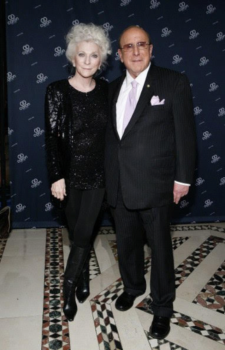
JC: Well, for instance, I interviewed…I know that Clive Davis hasn’t been on yet. I’m not a client, I’m a friend. I’ve known him for sixty years. I go to his parties, and so on. And I like him very much. He’s a special man, but I’m not a client. So, I can ask him questions that others might not. And I said, ‘Tell me, who, who got away?’ And he said, ‘Well, that’s a very good question. He said, nobody ever asked me that. They always asked me who I fired.’
MD: Right.
JC: And I said, ‘well, who was it that got away?’ And I was very surprised by the answer. He said it was Harry Chapin.
MD: Oh, wouldn’t have seen that coming.
JC: No. And he said, your guy, that is Jack Holtzman, who was the president of Elektra Records and who is still my very best friend. He’s still working in his nineties. And he said it was Jack. Jack outbid me.
MD: Right? That’s right, because he was on Elektra Records back in the day. I remember that
JC: First, he was on Columbia. And then Jack outbid him at Columbia. And Harry went to Elektra. So very interesting story. So sometimes you find things you didn’t know about. Sometimes people bring up things that you didn’t know they were going to talk about. So it’s very exciting. I love it, love doing this podcast.
MD: Other than Clive Davis, who else would you like to be talking to?
JC: Well, I have talked to Jeff Daniels to Julia Cameron to Christiane Amanpour, and so forth. You know, I’m looking to the future, and I’ll be doing more.
MD: Cool. Cool. And do you like talking to other musicians about music? Or is it more interesting to you to talk to somebody outside of what you do yourself?
JC: You know, I don’t, I don’t really know that I have much to say about music, except that we do it. I’m more interested in life. What do you do? What do you do when you’re not singing? What do you do when you’re alone in your cabin and, you know, there’s no shows that night. What do you watch? What do you read? Who do you call?
MD: So you’re in the Southwest now, which is kind of near Colorado where you grew up. So, is that having an effect on what you’re singing and how you’re feeling about the songs?
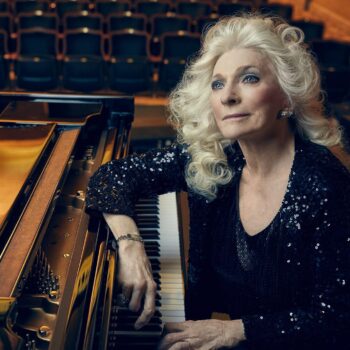 JC: Not really. I’m here because I Have a show here in a couple of days, but also my sister lives here. And I haven’t had a good long visit with my sister for a while. I saw her in August of 2021. But other than that, we haven’t really had a good sit down together. So that’s been wonderful.
JC: Not really. I’m here because I Have a show here in a couple of days, but also my sister lives here. And I haven’t had a good long visit with my sister for a while. I saw her in August of 2021. But other than that, we haven’t really had a good sit down together. So that’s been wonderful.
MD: And in general, being on the road, other than the fact the person who walked out on on Thomas Merton, what’s the what is the feeling like from the crowd? Are they comfortable being together, and you know, in a room together?
JC: People are so excited to be out and about, and being able to share an experience of a live show. These are just really wonderful. So I’m very happy about it. And I’ve been out since May of last year, so I’m really back in the groove again. And that’s perfect, just the way I like it.
MD: I think I read somewhere that there might be a second collection of all original material on the way; is that true?
JC: Oh, yeah. Yeah, it’s coming.
MD: And what kind of songs are those? Are they similar in spirit to what we’re hearing here on Spellbound?
JC: I’m not giving any of them away. You’ll have to hear them and make your own assessment. Everything. I think. is what it’s about.
MD: Alrighty. And do you plan on touring outside of the US at all?
JC: Oh, yes. In fact, we have a lot of things coming up, including a big tour in Europe. And in England, I tour in England, Scotland, Ireland quite frequently. And we did one in Hawaii, which is still the States. So yes, there’ll be a lot of touring. And I’ll get back to Norway. I have an album to do. I have something I have to do there. Eventually. Probably not ’til next year.
MD: Okay. So, no sign of slowing down?
JC: Why would I do that?
MD: I don’t know, just seems like the thing to ask.
JC: I’d love, love to get back to New Zealand and Australia. I love it there.
MD: Yeah, we’d love to have you. That’s for sure.
JC: Yeah, I’m really looking forward to that.
MD: Well, hopefully that will…we’ve just opened up the borders again. So, people are starting to trickle back into the country. And we’ll hopefully get some international acts here because it’s been a while.
JC: So good, good. Good. That’s good news.
MD: Absolutely. Well, it also good news that you’re still recording and cranking out the records, especially these songs are great. It just reveals more about you, which I think is what people want to hear about that in this time so yeah, thank you very much.
